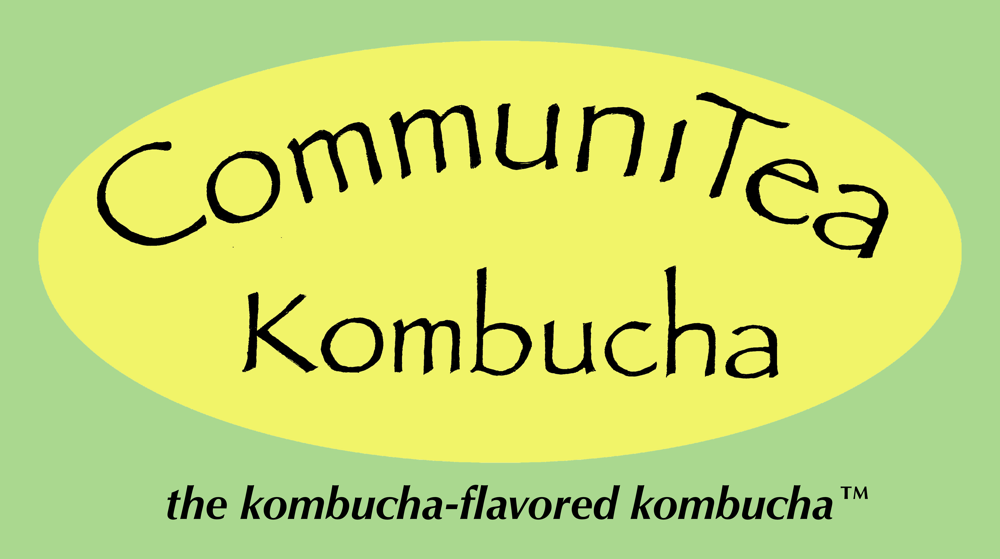WHY DOES YOUR KOMBUCHA HAVE ALCOHOL?
That this question arises speaks volumes about the general state of understanding of kombucha. CommuniTea Kombucha has a small amount of alcohol (1.5-2% Alcohol by Volume or ABV) because 1) alcohol is naturally produced during the production of kombucha and 2) we believe that any of the myriad ways people devise to limit or reduce the alcohol level have detrimental effects on the kombucha.
In simpler terms, the answer is: Because it is real kombucha. But there is more to the story.
Kombucha is a beverage made by fermenting sweet tea with a culture of yeast and bacteria. First, yeast eats sugar and makes alcohol, just as it does in wine and beer. Unlike with wine and beer, however, alcohol is not the end, but rather a first step in a more complex metabolic pathway. The alcohol is essential food for the bacteria. And it is the bacteria that are responsible for producing the long list of compounds that make kombucha valuable and delightful. We want to keep the bacteria happy and we want to make sure they get what they need.
The two biggest components of kombucha are acetic acid and gluconic acid. These acids and a long list of others (see below) – all created by the bacteria from the alcohol, remember – give kombucha its characteristic sour flavor notes. They are also responsible for its contributions to our health. In this and other areas, we keep our focus on providing what the bacteria and yeast need for their optimal livelihood, as we believe this is the best way to enable them to create the best kombucha.
In 2010, our industry was challenged by the beginning of regulation of kombucha as an alcoholic beverage. I worked mightily to determine if I could make great kombucha while keeping the alcohol level below 0.5% AB. If the level is above that, it is regulated as alcohol. I decided it was not possible. One customer gave a colorful reaction to efforts by other brewers to make kombucha with this limitation so they didn't have to call their products alcohol: he said it tasted like “emasculated dishwater.” (It isn’t difficult to understand how the temptation to add flavors would be nearly irresistible when faced with this outcome. This reaction has had a lot to do with the proliferation of flavorings in kombucha products.)
I had no specific desire to make a beverage with alcohol, but I did want to make kombucha about which I was both proud and excited. This essay would become too technical if I were to describe all the possibilities that are being explored today to market kombucha that can be legally sold to all ages. But the framework for understanding the context is this sentence from the federal body (Alcohol and Tobacco Tax and Trade Bureau or TTB) that regulates alcohol in this country:
“Under federal law, if the alcohol content of kombucha is 0.5% or more alcohol by volume, at any time during production, when bottled, or at any time after bottling, the kombucha is an alcohol beverage and is subject to TTB regulations.” https://www.ttb.gov/kombucha/
Practically speaking, this means you can’t let the yeast produce alcohol that the bacteria need willy-nilly and then eliminate the yeast so they don’t continue to make alcohol. And if the yeast are still present, there is nothing to prevent them from producing more alcohol if the temperature rises. Unfortunately, in my experience, the most common response of brewers is to not be truthful about this and to sell the kombucha anyway and say it isn’t their responsibility after it leaves their hands. This is clearly not the view of regulators. Major brands have been in legal trouble, some of them repeatedly, due to excess alcohol. Kombucha Dog has filed a number of suits based on the premise that brands which choose to disregard the law are illegally creating a competitive advantage by creating an unlevel playing field.
Here are two links which tell this important story:
So, why does our kombucha have alcohol? Because it is real kombucha.
“Chemical assays of kombucha beverage have indicated the presence of a variety of compounds,
including organic acids, mainly acetic, gluconic, and glucuronic acid (GlcUA), although citric, L-lactic, malic, tartaric, malonic, oxalic, succinic, pyruvic, and usnic acids may also be found;
sugars (sucrose, glucose, and fructose),
water soluble vitamins (B1, B2, B6, B12, C),
ethanol,
amino acids, biogenic amines, purines, pigments, lipids, proteins, hydrolytic enzymes,
acetic acid bacteria and lactic acid bacteria,
carbon dioxide,
polyphenols,
minerals (manganese, iron, nickel, copper, zinc, plumb, cobalt, chromium, and cadmium), anions (fluoride, chloride, bromide, iodide, nitrate, phosphate, and sulphate),
D-saccharic acid-1,4-lactone (DSL),
and metabolic products of yeasts and bacteria”
https://www.tandfonline.com/doi/full/10.1080/19476337.2017.1410499
Kombucha Brewers International has produced an invaluable website devoted to “Kombucha Research & Scientific Studies” at https://research.kombuchabrewers.org/
